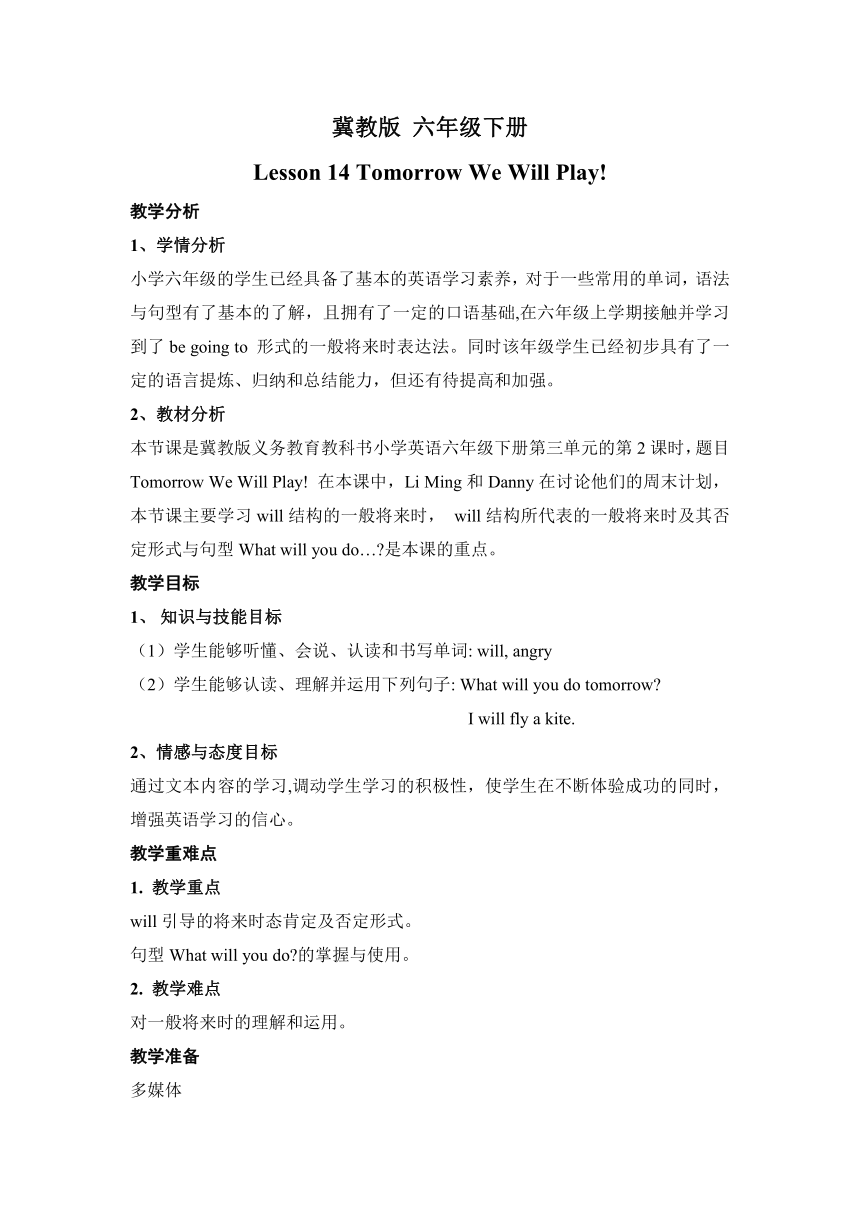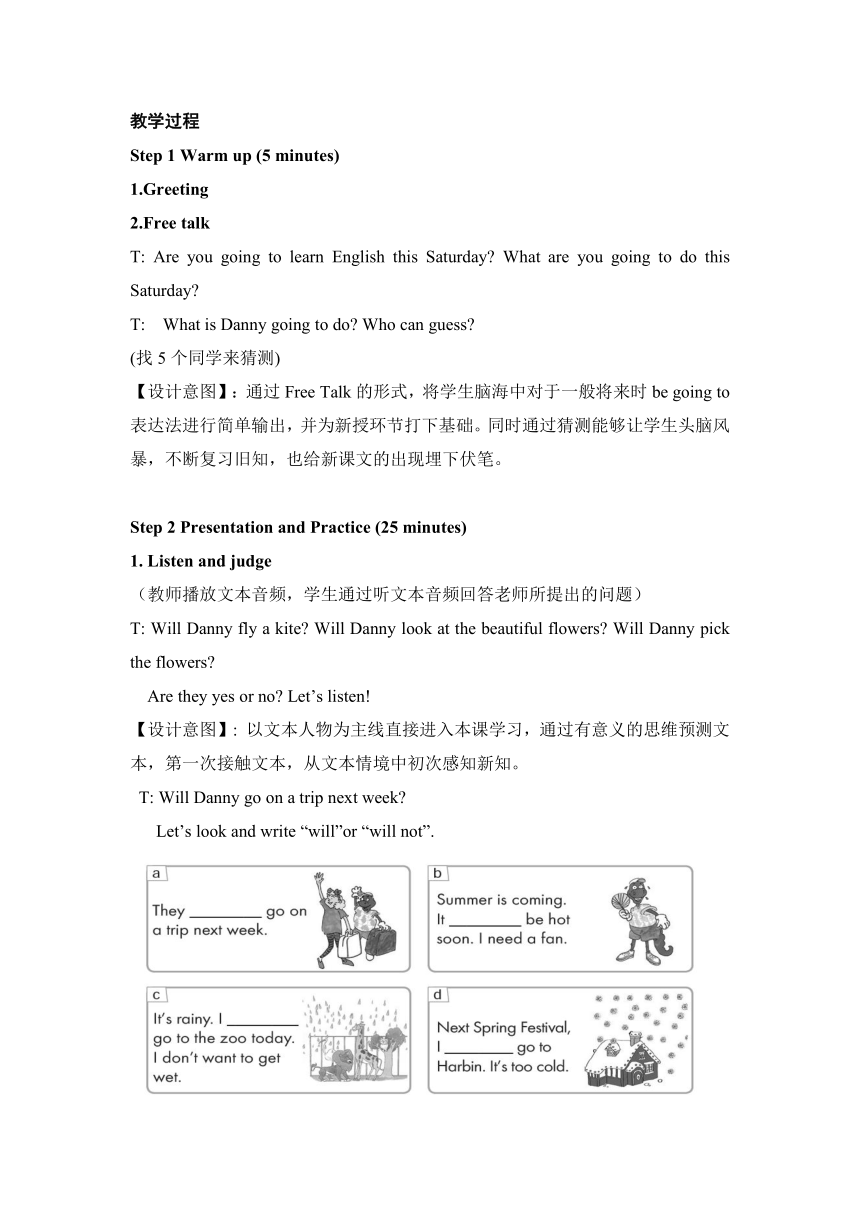Lesson 14 Tomorrow we will play 教案
文档属性
| 名称 | Lesson 14 Tomorrow we will play 教案 |

|
|
| 格式 | zip | ||
| 文件大小 | 397.6KB | ||
| 资源类型 | 教案 | ||
| 版本资源 | 冀教版(三年级起点) | ||
| 科目 | 英语 | ||
| 更新时间 | 2017-04-25 00:00:00 | ||
图片预览


文档简介
冀教版
六年级下册
Lesson
14
Tomorrow
We
Will
Play!
教学分析
1、学情分析
小学六年级的学生已经具备了基本的英语学习
( http: / / www.21cnjy.com )素养,对于一些常用的单词,语法与句型有了基本的了解,且拥有了一定的口语基础,在六年级上学期接触并学习到了be
going
to
形式的一般将来时表达法。同时该年级学生已经初步具有了一定的语言提炼、归纳和总结能力,但还有待提高和加强。
2、教材分析
本节课是冀教版义务教育教科书小学英语六年级
( http: / / www.21cnjy.com )下册第三单元的第2课时,题目Tomorrow
We
Will
Play!
在本课中,Li
Ming和Danny在讨论他们的周末计划,本节课主要学习will结构的一般将来时,
will结构所代表的一般将来时及其否定形式与句型What
will
you
do… 是本课的重点。
教学目标
知识与技能目标
(1)学生能够听懂、会说、认读和书写单词:
will,
angry
(2)学生能够认读、理解并运用下列句子:
What
will
you
do
tomorrow
I
will
fly
a
kite.
2、情感与态度目标
通过文本内容的学习,调动学生学习的积极性,使学生在不断体验成功的同时,增强英语学习的信心。
教学重难点
1.
教学重点
will引导的将来时态肯定及否定形式。
句型What
will
you
do 的掌握与使用。
2.
教学难点
对一般将来时的理解和运用。
教学准备
多媒体
教学过程
Step
1
Warm
up
(5
minutes)
1.Greeting
2.Free
talk
T:
Are
you
going
to
l
( http: / / www.21cnjy.com )earn
English
this
Saturday
What
are
you
going
to
do
this
Saturday
T:
What
is
Danny
going
to
do
Who
can
guess
(找5个同学来猜测)
【设计意图】:通过Free
( http: / / www.21cnjy.com )
Talk的形式,将学生脑海中对于一般将来时be
going
to
表达法进行简单输出,并为新授环节打下基础。同时通过猜测能够让学生头脑风暴,不断复习旧知,也给新课文的出现埋下伏笔。
Step
2
Presentation
and
Practice
(25
minutes)
1.
Listen
and
judge
(教师播放文本音频,学生通过听文本音频回答老师所提出的问题)
T:
Will
Danny
fly
a
( http: / / www.21cnjy.com )
kite
Will
Danny
look
at
the
beautiful
flowers
Will
Danny
pick
the
flowers
Are
they
yes
or
no
Let’s
listen!
【设计意图】:
以文本人物为主线直接进入本课学习,通过有意义的思维预测文本,第一次接触文本,从文本情境中初次感知新知。
T:
Will
Danny
go
on
a
trip
next
week
Let’s
look
and
write
“will”or
“will
not”.
【设计意图】结合现有教材,运用生动的语言,引导学生分析教材,使学生及时将所学知识能够达到充分运用。
2.
Read
and
answer
(1)(学生通过自由读课文回答教师提出问题)
T:Danny
will
not
( http: / / www.21cnjy.com )fly
a
kite.
What
about
Jenny
What
will
they
do
tomorrow
Let’s
read
the
text,
then
answer
my
questions.
Questions:
Where
will
they
go
tomorrow
What
will
Jenny
do
What
will
Danny
do
tomorrow
Danny
will
not
pick
the
flower.
What
does
he
say
to
Jenny
(2)(教师反馈答案过程中新授一般将来时)
T:
Where
will
they
go
tomorrow
T:
What
will
Jenny
do
in
the
park
T:
What will Danny do tomorrow
T:
Can
Danny
pick
the
flowers
T:
If
he
picks
the
flowers,
what
will
he
do
【设计意图】学生第二次接触文本,通
( http: / / www.21cnjy.com )过细读文本,找出问题答案。读并寻找问题答案,让学生带着目的用英语做事情,从中感知并在头脑中提炼总结一般将来时will肯定及否定表达法,并且尝试运用语言表达。
(3)(学生选择图片并描述人物的感受并模仿Jenny生气语气)
T:
If
Danny
do
that,
how
is
Jenny
now
T:
Yes,
Jenny
is
angry.
Is
the
man
angry
Who
else
is
angry
T:
Yes,
they
are
angry
( http: / / www.21cnjy.com ),
and
Jenny
is
angry.
What
does
Jenny
say
to
Danny
Who
can
say
it
like
Jenny
T:
What
will
you
do
when
you
are
angry
Can
you
act
it
out
T:
What
does
Danny
say
【设计意图】教师在反馈学生
( http: / / www.21cnjy.com )答案的同时,给学生渗透will结构的一般将来时,will引导的特殊疑问句what
will
you
do…
等语法。从文本情景出发,操练angry在句子中的用法。学生通过选择图片描述人物的感受,学生进一步体会angry一词,通过模仿Jenny生气的语气来增加学习的趣味性,通过意义思维,转化成自己的想法来演绎现实生活中的真实情景。
3.
Imitate
and
act
(学生尝试模仿读文本,然后自己选择喜欢的角色两人一组做角色扮演)
T:
Now
try
to
imitate,
then
act
it
out.
【设计意图】回归文本,让学生对所学重点在头脑中进行总结并沉淀,学生可以自主选择自己喜欢的角色,创造以学生为主体的自主学习氛围。
4.
Look,
draw
and
write
(学生在模仿朗读课文后完成练习题)
T:
Do
you
have
any
questions
about
this
text
Let’s
look,
draw
and
write.
【设计意图】:学生通过操练不断扎实一般将来时的运用,第三人称到第一人称做充分的操练,再次夯实知识点,并且由口头落实到笔端。
Step
3
Production
(9
minutes)
T:
All
of
yo
( http: / / www.21cnjy.com )u
will
have
a
good
tomorrow.
You
know
our
summer
holiday
is
coming.
What
will
your
family
do
this
summer
holiday
Now
make
a
plan
for
your
family’s
summer
holiday.
You
can
talk
about
it
with
your
partner.
【设计意图】通过谈论暑假出行计划,贴近学生生活的话题,激发学生用英语表达的欲望,培养学生的语言运用能力。
Step
4
Homework
(1
minute)
Write
an
e-mail
to
Jenny.
She
wants
to
enjoy
your
holiday.
Such
as:
on
weekends,
on
Children’s
Day
or
summer
holiday.
【设计意图】:通过时下流行交流方式来完成课后作业,让学生积极完成作业,把重点知识的学习延伸到课堂之外。
板书设计
Lesson
14
Tomorrow
We
Will
Play!
What
will
you
do
tomorrow
I
will
fly
a
kite
tomorrow.
六年级下册
Lesson
14
Tomorrow
We
Will
Play!
教学分析
1、学情分析
小学六年级的学生已经具备了基本的英语学习
( http: / / www.21cnjy.com )素养,对于一些常用的单词,语法与句型有了基本的了解,且拥有了一定的口语基础,在六年级上学期接触并学习到了be
going
to
形式的一般将来时表达法。同时该年级学生已经初步具有了一定的语言提炼、归纳和总结能力,但还有待提高和加强。
2、教材分析
本节课是冀教版义务教育教科书小学英语六年级
( http: / / www.21cnjy.com )下册第三单元的第2课时,题目Tomorrow
We
Will
Play!
在本课中,Li
Ming和Danny在讨论他们的周末计划,本节课主要学习will结构的一般将来时,
will结构所代表的一般将来时及其否定形式与句型What
will
you
do… 是本课的重点。
教学目标
知识与技能目标
(1)学生能够听懂、会说、认读和书写单词:
will,
angry
(2)学生能够认读、理解并运用下列句子:
What
will
you
do
tomorrow
I
will
fly
a
kite.
2、情感与态度目标
通过文本内容的学习,调动学生学习的积极性,使学生在不断体验成功的同时,增强英语学习的信心。
教学重难点
1.
教学重点
will引导的将来时态肯定及否定形式。
句型What
will
you
do 的掌握与使用。
2.
教学难点
对一般将来时的理解和运用。
教学准备
多媒体
教学过程
Step
1
Warm
up
(5
minutes)
1.Greeting
2.Free
talk
T:
Are
you
going
to
l
( http: / / www.21cnjy.com )earn
English
this
Saturday
What
are
you
going
to
do
this
Saturday
T:
What
is
Danny
going
to
do
Who
can
guess
(找5个同学来猜测)
【设计意图】:通过Free
( http: / / www.21cnjy.com )
Talk的形式,将学生脑海中对于一般将来时be
going
to
表达法进行简单输出,并为新授环节打下基础。同时通过猜测能够让学生头脑风暴,不断复习旧知,也给新课文的出现埋下伏笔。
Step
2
Presentation
and
Practice
(25
minutes)
1.
Listen
and
judge
(教师播放文本音频,学生通过听文本音频回答老师所提出的问题)
T:
Will
Danny
fly
a
( http: / / www.21cnjy.com )
kite
Will
Danny
look
at
the
beautiful
flowers
Will
Danny
pick
the
flowers
Are
they
yes
or
no
Let’s
listen!
【设计意图】:
以文本人物为主线直接进入本课学习,通过有意义的思维预测文本,第一次接触文本,从文本情境中初次感知新知。
T:
Will
Danny
go
on
a
trip
next
week
Let’s
look
and
write
“will”or
“will
not”.
【设计意图】结合现有教材,运用生动的语言,引导学生分析教材,使学生及时将所学知识能够达到充分运用。
2.
Read
and
answer
(1)(学生通过自由读课文回答教师提出问题)
T:Danny
will
not
( http: / / www.21cnjy.com )fly
a
kite.
What
about
Jenny
What
will
they
do
tomorrow
Let’s
read
the
text,
then
answer
my
questions.
Questions:
Where
will
they
go
tomorrow
What
will
Jenny
do
What
will
Danny
do
tomorrow
Danny
will
not
pick
the
flower.
What
does
he
say
to
Jenny
(2)(教师反馈答案过程中新授一般将来时)
T:
Where
will
they
go
tomorrow
T:
What
will
Jenny
do
in
the
park
T:
What will Danny do tomorrow
T:
Can
Danny
pick
the
flowers
T:
If
he
picks
the
flowers,
what
will
he
do
【设计意图】学生第二次接触文本,通
( http: / / www.21cnjy.com )过细读文本,找出问题答案。读并寻找问题答案,让学生带着目的用英语做事情,从中感知并在头脑中提炼总结一般将来时will肯定及否定表达法,并且尝试运用语言表达。
(3)(学生选择图片并描述人物的感受并模仿Jenny生气语气)
T:
If
Danny
do
that,
how
is
Jenny
now
T:
Yes,
Jenny
is
angry.
Is
the
man
angry
Who
else
is
angry
T:
Yes,
they
are
angry
( http: / / www.21cnjy.com ),
and
Jenny
is
angry.
What
does
Jenny
say
to
Danny
Who
can
say
it
like
Jenny
T:
What
will
you
do
when
you
are
angry
Can
you
act
it
out
T:
What
does
Danny
say
【设计意图】教师在反馈学生
( http: / / www.21cnjy.com )答案的同时,给学生渗透will结构的一般将来时,will引导的特殊疑问句what
will
you
do…
等语法。从文本情景出发,操练angry在句子中的用法。学生通过选择图片描述人物的感受,学生进一步体会angry一词,通过模仿Jenny生气的语气来增加学习的趣味性,通过意义思维,转化成自己的想法来演绎现实生活中的真实情景。
3.
Imitate
and
act
(学生尝试模仿读文本,然后自己选择喜欢的角色两人一组做角色扮演)
T:
Now
try
to
imitate,
then
act
it
out.
【设计意图】回归文本,让学生对所学重点在头脑中进行总结并沉淀,学生可以自主选择自己喜欢的角色,创造以学生为主体的自主学习氛围。
4.
Look,
draw
and
write
(学生在模仿朗读课文后完成练习题)
T:
Do
you
have
any
questions
about
this
text
Let’s
look,
draw
and
write.
【设计意图】:学生通过操练不断扎实一般将来时的运用,第三人称到第一人称做充分的操练,再次夯实知识点,并且由口头落实到笔端。
Step
3
Production
(9
minutes)
T:
All
of
yo
( http: / / www.21cnjy.com )u
will
have
a
good
tomorrow.
You
know
our
summer
holiday
is
coming.
What
will
your
family
do
this
summer
holiday
Now
make
a
plan
for
your
family’s
summer
holiday.
You
can
talk
about
it
with
your
partner.
【设计意图】通过谈论暑假出行计划,贴近学生生活的话题,激发学生用英语表达的欲望,培养学生的语言运用能力。
Step
4
Homework
(1
minute)
Write
an
to
Jenny.
She
wants
to
enjoy
your
holiday.
Such
as:
on
weekends,
on
Children’s
Day
or
summer
holiday.
【设计意图】:通过时下流行交流方式来完成课后作业,让学生积极完成作业,把重点知识的学习延伸到课堂之外。
板书设计
Lesson
14
Tomorrow
We
Will
Play!
What
will
you
do
tomorrow
I
will
fly
a
kite
tomorrow.
同课章节目录
- Unit 1 Sports
- Lesson 1 Ping-pong and basketball
- Lesson 2 At the sports Shop
- Lesson 3 Let's Play!
- Lesson 4 Did You Have Fun?
- Lesson 5 A Basketball Game
- Lesson 6 A Famous Football Playe
- Again, please!
- Unit 2 Good Health to You!
- Lesson 7 Always Have breakfast!
- Lesson 8 Always Brush Your Teeth!
- Lesson 9 Eat More Vegetables and Fruit!
- Lesson 10 Exercise
- Lesson 11 Work hard!
- Lesson 12 Helen Kelle
- Again, please!
- Unit 3 What Will You Do This Summer?
- Lesson 13 Summer is coming!
- Lesson 14 Tomorrow We Will Play
- Lesson 15 Jenny's Summer Holiday
- Lesson 16 Li Ming's Summer Holiday
- Lesson 17 Danny's Summer Holiday
- Lesson 18 Three Kites in the Sky
- Again, please!
- Unit 4 Li Ming Comes Home
- Lesson 19 Buying Gifts
- Lesson 20 Looking at Photos
- Lesson 21 A party for Li Ming
- Lesson 22 Surprise!
- Lesson 23 Good-bye!
- Lesson 24 Danny's Surprise Cake
- Again, please!
